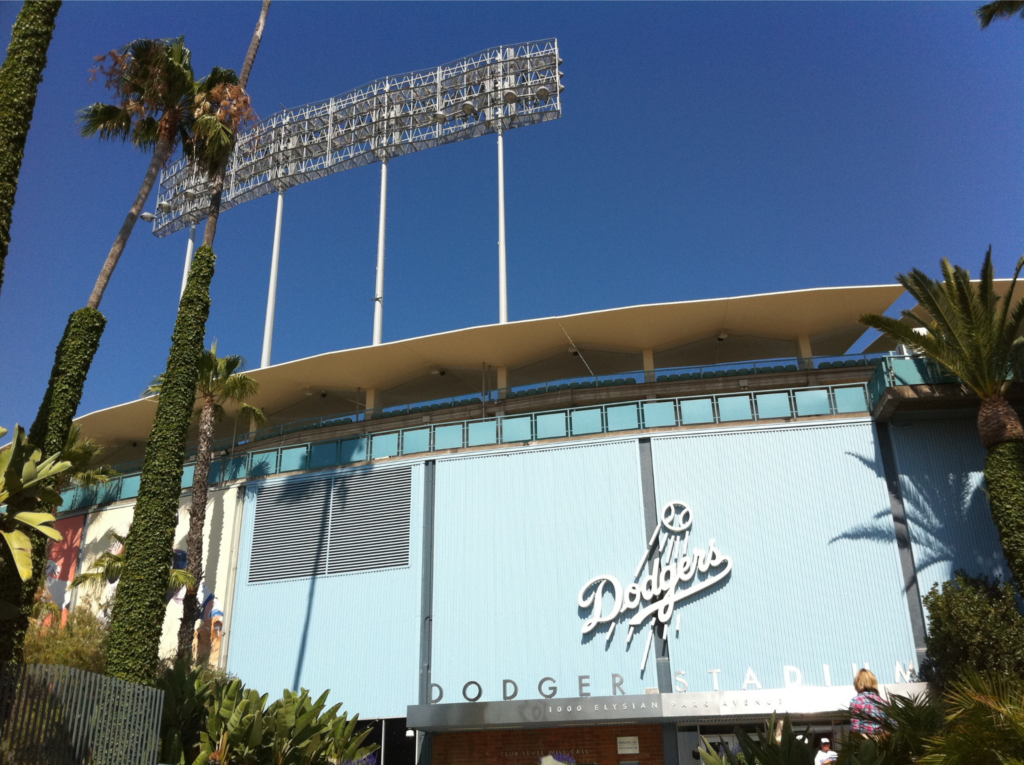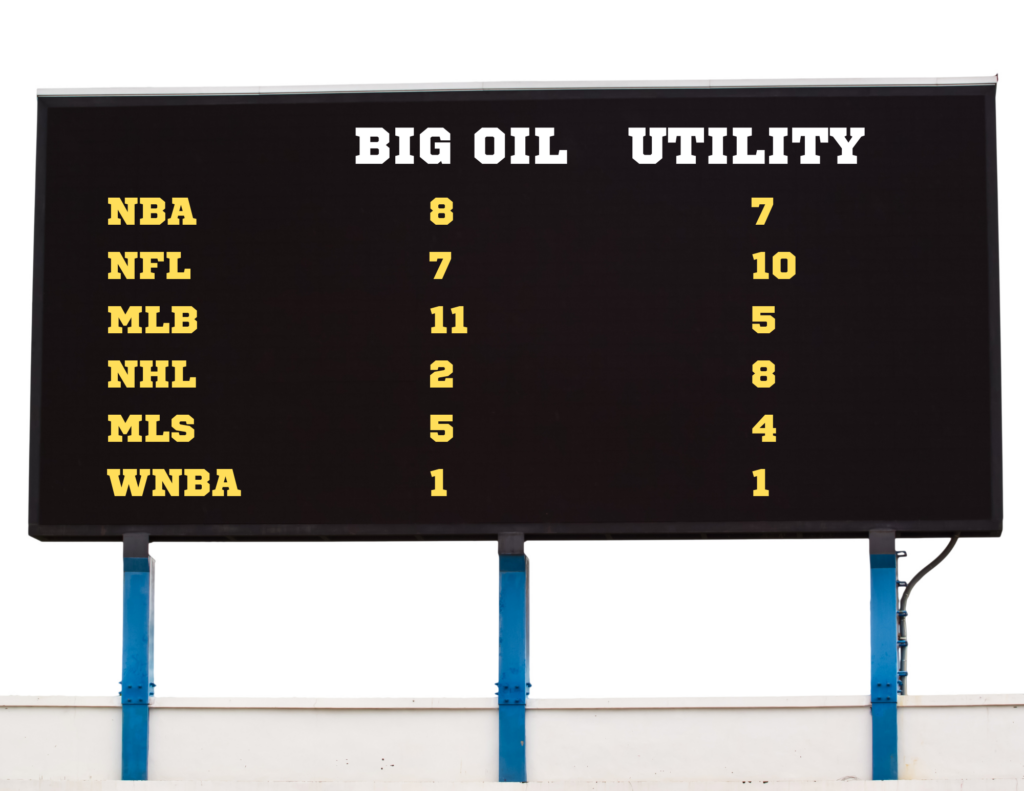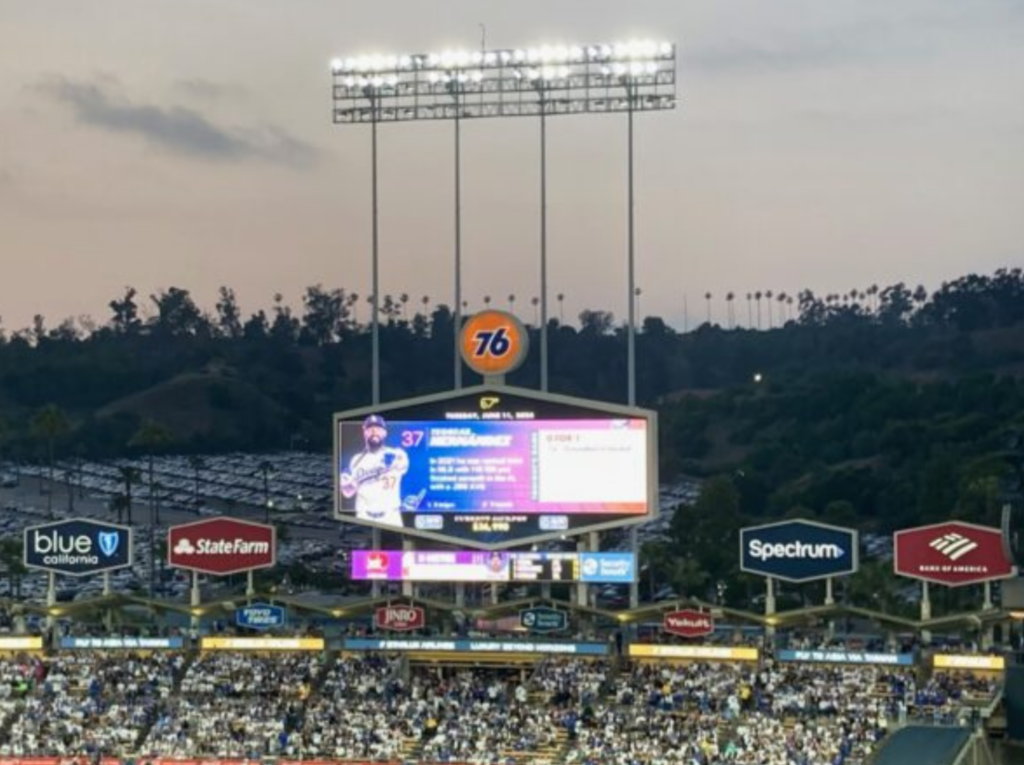A Good Day to Drop Big Oil
Major league sports teams like to talk about sustainability measures on Green Sports Day, which is Oct. 6. They should do something about their fossil fuel sponsors.

On Sunday, October 6, sports teams throughout the U.S. will participate in something called Green Sports Day, an annual event to promote sustainability in sports. Often, it’s a chance for a franchise to promote the recycling or energy conservation that goes on at its stadium.
One thing these teams almost certainly will not be talking about—but should be—is the oil and gas companies that continue to buy influence with American audiences through a wide range of sponsorships in major league sports.
A survey I conducted of 2024 sponsorships across the NBA, NFL, MLB, NHL, MLS, and WNBA reveals more than 60 sponsorship deals with high-polluting companies. This includes sponsorship deals with oil and gas companies—big names you would recognize from highway off-ramps. But it also includes deals with lesser-known utility companies that generate electricity predominantly from fossil fuel-burning power plants and that sell fossil gas directly to consumers. This at a time when the United Nations has encouraged countries to ban fossil fuel advertising as a way to prevent harmful “greenwashing” by polluters who stand in the way of addressing the climate crisis.

My “Foul Ball” survey was published by the UCLA Emmett Institute on Climate Change & the Environment in September. Since publishing the survey, 8 more sponsorship deals have been added to the spreadsheet, for a total of 69, either because they were not included in the original data set that we used, or because they are brand new deals. A report by the New Weather Institute found that “sportswashing” is a $5.6 Billion industry. While Big Oil sponsorships are a global phenomenon, they’re also hyper local. It can mean that your child’s field trip to a science workshop sponsored by the local football team includes oil company branding and talking points. It can also mean that your family photos taken inside the stadium include a prominently displayed oil company logo.
Take my hometown ball club. The beloved LA Dodgers are making a serious run for the 2024 World Series thanks to Shohei Ohtani’s inspiring performances, but the team is anything but serious when it comes to addressing the environmental impact of their most prominent corporate sponsor: Phillips 66. The oil company’s bright orange 76 gas station logo sits high atop the outfield scoreboards.
This sponsorship is at odds with our city and state’s ambitious climate goals, progressive values toward environmental stewardship, and aggressive approach to suing Big Oil. The state has active litigation against Chevron, ConocoPhillips, Phillips 66, Exxon Mobil, Shell, BP and other defendants for allegedly deceiving the public about the risk of their product and climate change for decades. “The scale of the devastating public nuisance created by Defendants’ egregious misconduct is truly staggering, and California will be dealing with the consequences of this misconduct for many generations,” reads California’s complaint.
The Dodgers are hardly alone in Major League Baseball. The MLB has at least 15 oil, gas, and utility sponsorships. That includes the Houston Astros, who wear an Occidental Petroleum sponsorship on their jersey and have long partnered with ConocoPhillips. It includes the Cleveland Guardians, who sold their jersey sleeve to Marathon Petroleum and who have another sponsorship deal with First Energy, a utility company that generates electricity by burning fossil fuels and was ranked dead last in renewable energy among investor-owned utilities in 2023. It includes the San Francisco Giants who count Chevron as a sponsor and allow the oil company not only to hang banners in Oracle Stadium but to present science events to fans.
On Green Sports Day this Sunday, it is entirely possible that the Giants, Dodgers, and Astros will celebrate by participating in a shoe drive, planting some trees, or lighting up their stadiums with green LEDs. All three teams are members of the Green Sports Alliance, the trade group that organizes the Oct. 6 event. But the Dodgers’ own account of its green initiatives is pretty pathetic: they tout recycling cans, plastic bags, and cardboard. The Astros promote that they donate left-over food and “completed the change to LED lighting in the player parking garage and over 80% of the ballpark’s restrooms.” The Giants meanwhile were the recipient of the 2022 “Green Glove Award,” which celebrates the team with the “highest waste diversion rate.”
Let’s be clear: if these teams and dozens of others in U.S. major league sports care about environmental sustainability, they would not wear an oil company’s logo on their sleeves, elevate them at the top of the scoreboard, help sell their gas, or let them teach science to school children.
 We know what Phillips 66 wants out of these sponsorships. “Collaborating with these respected organizations integrates our brand with consumer passion points,” reads an August 2024 press release about a new deal with the Houston Texans football team. My UCLA Emmett Institute colleague Cara Horowitz first blogged about the Dodgers’ Big Oil ties in June. Since then, a grassroots campaign calling on the Dodgers to cut ties with Phillips 66 has collected more than 22,000 signatures. Los Angeles Times climate columnist Sammy Roth has done a series of deeply reported pieces about the relationship between oil companies and sports teams. The Dodgers, Giants, LAFC, Sacramento Kings, and other teams have all refused to comment about their Big Oil sponsors. But that isn’t stopping Phillips 66 from inking new deals and gloating about “the latest play in its sponsorship strategy.” This new Houston deal includes “game day activation” where fans can create sports cards of themselves that promote the gas station’s app. “This sponsorship strategy is not just about logo placement,” the release says, but also about “enhancing our brand presence.” The deal also includes naming rights, meaning that the Texans’ stadium already named for a fossil fuel-reliant energy company—NRG Energy—will now have a gate named after an oil company. That may be what Texans want. What about Californians?
We know what Phillips 66 wants out of these sponsorships. “Collaborating with these respected organizations integrates our brand with consumer passion points,” reads an August 2024 press release about a new deal with the Houston Texans football team. My UCLA Emmett Institute colleague Cara Horowitz first blogged about the Dodgers’ Big Oil ties in June. Since then, a grassroots campaign calling on the Dodgers to cut ties with Phillips 66 has collected more than 22,000 signatures. Los Angeles Times climate columnist Sammy Roth has done a series of deeply reported pieces about the relationship between oil companies and sports teams. The Dodgers, Giants, LAFC, Sacramento Kings, and other teams have all refused to comment about their Big Oil sponsors. But that isn’t stopping Phillips 66 from inking new deals and gloating about “the latest play in its sponsorship strategy.” This new Houston deal includes “game day activation” where fans can create sports cards of themselves that promote the gas station’s app. “This sponsorship strategy is not just about logo placement,” the release says, but also about “enhancing our brand presence.” The deal also includes naming rights, meaning that the Texans’ stadium already named for a fossil fuel-reliant energy company—NRG Energy—will now have a gate named after an oil company. That may be what Texans want. What about Californians?
What do the Dodgers, and their corporate owners, want? What about the Giants? Do they want to sell their fans’ “passion points” or lead sports in a new direction? The tag line for Green Sports Day is “Inspire Action. Demonstrate Leadership. Impact Community.” Sounds like a good day for any team that talks a big game on sustainability to put their money where their mouth is and cut ties with fossil fuel sponsors.
Reader Comments
2 Replies to “A Good Day to Drop Big Oil”
Comments are closed.




Evan,
Thanks for your excellent piece on sustainability in sports.
There is a huge opportunity to use sports as a base for sustainability efforts at many different levels. All sports leagues and teams should calculate their emissions and do an emissions reduction plan. The emissions for sports teams at all levels are out of control, from 12 year old teams flying across the country to vast numbers of one-player SUVs flocking to soccer practice.
Oil companies provide us fuel which is necessary for our lives. All of us depend on oil, we cannot escape it. Thank God for all the blessings that flow from an abundance of petroleum. Ignore the stupid delusions and lies that falsely claim to mitigate climate change. Stay away from sinful people who reject God and be happy despite them.